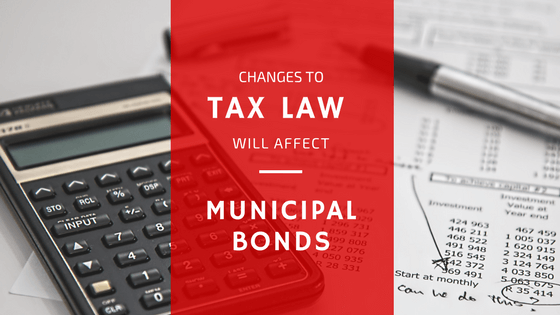The new tax legislation promises to alter the municipal bond tax landscape. Muni investors are smart to pay close attention to the upcoming reconciliation process. Their tax liability and muni yields hang in the balance.
Until Congress completes reconciliation, none of the changes can be taken for granted. The House and Senate bills are just too far apart on many subjects that affect the muni market. There is little way to know which aspects of which measure will prevail. Because of this, muni investors should watch Congress closely but avoid recalibrating their portfolios until the final tax bill passes.
Individual-investor demand for municipal bonds unlikely to diminish
With the new bill’s reduction in tax rates, many investors are gravely concerned a muni selloff will reduce their values. After all, municipal bonds pay lower interest rates compared to corporate bonds. Muni bonds are only attractive to investors whose tax savings outweigh the decreased interest. Tax reform promises to diminish this incentive.
Though the bill promises tax savings, those tax savings won’t be enough to erase the benefits of municipal bonds for taxpayers in brackets paying above 25.6 percent, according to an analysis by Charles Schwab, investors above this tax bracket stand to save money on federal taxes while retaining the benefits of municipal bond tax status. If anything, demand for muni bonds may increase.
This is especially the case if the Senate bill’s provision of eliminating the deductions for state and local taxes prevails. In high tax states like New York or California, some taxpayers could see an increase in marginal tax rates, the Schwab analysis notes. Investors in top tax brackets are sure to seek tax-exempt income sources. Municipal bonds fit the bill.
Constraints on municipal bond supply?
Under the House bill, municipal governments are prohibited from releasing private activity bonds (PAB) after December 31, 2017. PABs are municipal bonds issued by state and local governments to fund special projects, such as airports, hospitals, and universities. PABs accounted for 20 percent of new muni issuance in 2016, according to Bond Buyer. This decreased issuance could push muni yields down in comparison the treasuries, which could also spell trouble for smaller issuers, such as rural hospitals. Without PABs, they may need to resort to taxable bonds, which increases their borrowing costs and their odds of defaulting.
Muni investors should also watch bank’s demand for muni bonds, which may be affected by corporate tax rates making other bonds more attractive, causing banks to curtail their muni exposure. It is also important to remember that the benefits of municipal bonds go beyond tax incentives. They are also very high-quality investments, with average default rates of just 1 percent of new issues this year. Muni bonds are likely to remain attractive investments. Muni investors should keep an eye on the progress of the tax bill and adjust their holdings according to the outcome.
